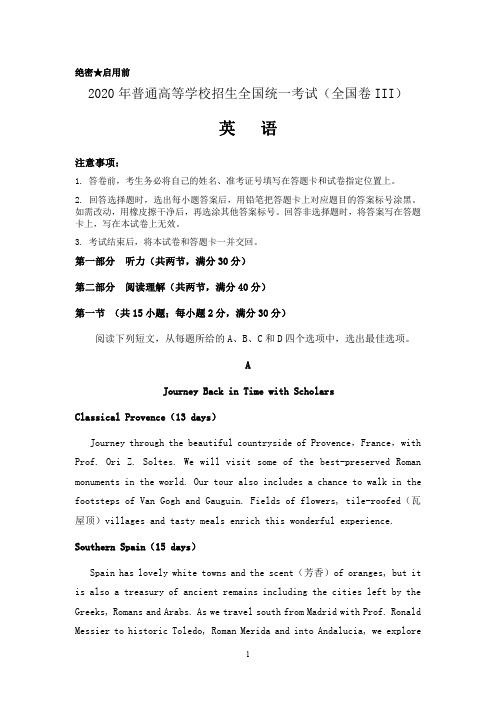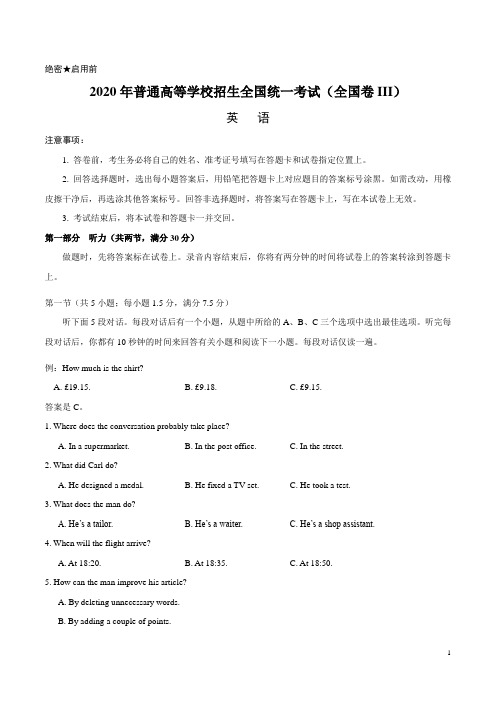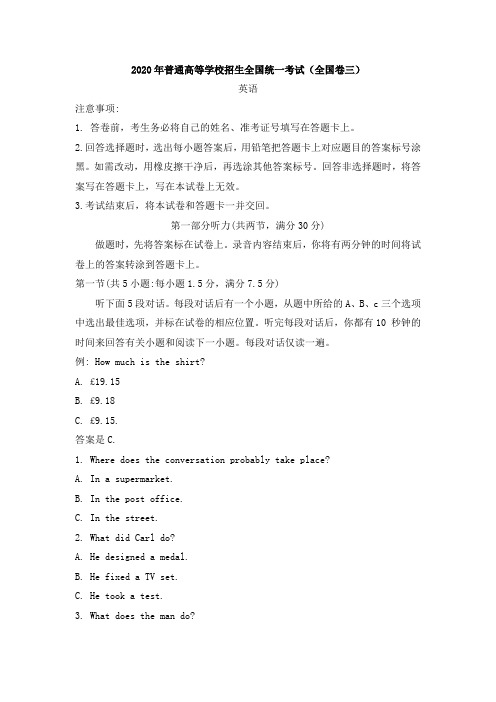最新高考英语全国卷3(附答案)
2020年全国卷Ⅲ英语高考试题及答案(word版)

绝密★启用前2020年普通高等学校招生全国统一考试(全国卷III)英语(全国卷Ⅲ适用地区:云南、广西、贵州、四川、西藏等地区)注意事项:1. 答卷前,考生务必将自己的姓名、准考证号填写在答题卡和试卷指定位置上。
2. 回答选择题时,选出每小题答案后,用铅笔把答题卡上对应题目的答案标号涂黑。
如需改动,用橡皮擦干净后,再选涂其他答案标号。
回答非选择题时,将答案写在答题卡上,写在本试卷上无效。
3. 考试结束后,将本试卷和答题卡一并交回。
第一部分听力(共两节,满分30分)做题时,先将答案标在试卷上。
录音内容结束后,你将有两分钟的时间将试卷上的答案转涂到答题卡上。
第一节(共5小题;每小题分,满分分)听下面5段对话。
每段对话后有一个小题,从题中所给的A、B、C三个选项中选出最佳选项。
听完每段对话后,你都有10秒钟的时间来回答有关小题和阅读下一小题。
每段对话仅读一遍。
例:How much is the shirtA. £.B. £.C. £.答案是C。
1. Where does the conversation probably take placeA. In a supermarket.B. In the post office.C. In the street.2. What did Carl doA. He designed a medal.B. He fixed a TV set.C. He took a test.3. What does the man doA. He’s a tailor.B. He’s a waiter.C. He’s a shop assistant.4. When will the flight arriveA. At 18:20.B. At 18:35.C. At 18:50.5. How can the man improve his articleA. By deleting unnecessary words.B. By adding a couple of points.C. By correcting grammar mistakes.第二节(共15小题;每小题分,满分分)听下面5段对话或独白。
清晰版2020年高考全国Ⅲ卷英语试卷及答案

绝密★启用前2020年普通高等学校招生全国统一考试(全国卷III)英语注意事项:1.答卷前,考生务必将自己的姓名、准考证号填写在答题卡和试卷指定位置上。
2.回答选择题时,选出每小题答案后,用铅笔把答题卡上对应题目的答案标号涂黑。
如需改动,用橡皮擦干净后,再选涂其他答案标号。
回答非选择题时,将答案写在答题卡上,写在本试卷上无效。
3.考试结束后,将本试卷和答题卡一并交回。
第一部分听力(共两节,满分30分)第二部分阅读理解(共两节,满分40分)第一节(共15小题;每小题2分,满分30分)阅读下列短文,从每题所给的A、B、C和D四个选项中,选出最佳选项。
AJourney Back in Time with ScholarsClassical Provence(13days)Journey through the beautiful countryside of Provence,France,withProf.Ori Z.Soltes.We will visit some of the best-preserved Romanmonuments in the world.Our tour also includes a chance to walk in thefootsteps of Van Gogh and Gauguin.Fields of flowers,tile-roofed(瓦屋顶)villages and tasty meals enrich this wonderful experience. Southern Spain(15days)Spain has lovely white towns and the scent(芳香)of oranges,but itis also a treasury of ancient remains including the cities left by theGreeks,Romans and Arabs.As we travel south from Madrid with Prof.RonaldMessier to historic Toledo,Roman Merida and into Andalucia,we explorehistorical monuments and architecture.China’s Sacred Landscapes(21days)Discover the China of“past ages,”its walled cities,temples and mountain scenery with Prof.Robert Thorp.Highlights(精彩之处)include China’s most sacred peaks at Mount Tai and Hangzbou’s rolling hills, waterways and peaceful temples.We will wander in traditional small towns and end our tour with an exceptional museum in Shanghai.Tunisia(17days)Join Prof.Pedar Foss on our in-depth Tunisian tour.Tour highlights include the Roman city of Dougga,the underground Numidian capital at Bulla Regia,Roman Sbeitla and the remote areas around Tataouine and Matmata,uique for underground cities.Our journey takes us to picturesque Berber villages and lovely beaches.21.What can visitors see in both Classical Provence and Southern Spain?A.Historical monuments.B.Fields of flowers.C.Van Gogh’s paintings.D.Greek buildings.22.Which country is Prof.Thorp most knowledgeable about?A.France.B.Spain.C.China.D.Tunisia.23.Which of the following highlights the Tunisian tour?A.White towns.B.Underground cities.C.Tile-roofed villages.D.Rolling hills.BWhen"Rise of the Planet of the Apes"was first shown to the public last month,a group of excited animal activists gathered on Hollywood Boulevard.But they weren’t there to throw red paint on fur-coat-wearingfilm stars.Instead,one activist,dressed in a full-body monkey suit, had arrived with a sign praising the filmmakers:"Thanks for not using real apes(猿)!"The creative team behind"Apes"used motion-capture(动作捕捉) technology to create digitalized animals,spending tens of millions of dollars on technology that records an actor’s performance and later processes it with computer graphics to create a final image(图像).In this case,one of a realistic-looking ape.Yet"Apes"is more exception than the rule.In fact,Hollywood has been hot on live animals lately.One nonprofit organization,which monitors the treatment or animals in filmed entertainment,is keeping tabs on more than2,000productions this year.Already,a number of films, including"Water for Elephants,""The Hangover PartⅡ"and"Zookeeper," have drawn the anger of activists who say the creatures acting in them haven’t been treated properly.In some cases,it’s not so much the treatment of the animals on set in the studio that has activists worried;it’s the off-set training and living conditions that are raising concerns.And there are questions about the films made outside the States,which sometimes are not monitored as closely as productions filmed in the Sates.24.Why did the animal activists gather on Hollywood Boulevard?A.To see famous film stars.B.To oppose wearing fur coats.C.To raise money for animal protection.D.To express thanks to some filmmakers.25.What does paragraph2mainly talk about?A.The cost of making"Apes."B.The creation of digitalized apes.C.The publicity about“Apes."D.The performance of real apes.26.What does the underlined phrase"keeping tabs on"in paragraph3 probably mean?A.Listing completely.B.Directing professionally.C.Promoting successfully.D.Watching carefully.27.What can we infer from the last paragraph about animal actors?A.They may be badly treated.B.They should take further training.C.They could be traded illegally.D.They would lose popularity.CWith the young unable to afford to leave home and the old at risk of isolation(孤独),more families are choosing to live together.The doorway to peace and quiet,for Nick Bright at least,leads straight to his mother-in-law,she lives on the ground floor,while he lives upstairs with his wife and their two daughters.Four years ago they all moved into a three-storey Victorian house in Bristol—one of a growing number of multigenerational families in the UK living together under the same roof.They share a front door and awashing machine,but Rita Whitehead has her own kitchen,bathroom,bedroom and living room on the ground floor.“We floated the idea to my mum of sharing a house,”says Kathryn Whitehead.Rita cuts in:“We spoke more with Nick because I think it’s a big thing for Nick to live with his mother-in-law.”And what does Nick think?“From my standpoint,it all seems to work very well.Would I recommend it?Yes,I think I would.”It’s hard to tell exactly how many people agree with him,but research indicates that the numbers have been rising for some time.Official reports suggest that the number of households with three generations living together had risen from325,000in2001to419,000in2013.Other varieties of multigenerational family are more common.Some people live with their elderly parents;many more adult children are returning to the family home,if they ever left.It is said that about 20%of25-34-year-olds live with their parents,compared with16%in 1991.The total number of all multigenerational households in Britain is thought to be about1.8million.Stories like that are more common in parts of the world where multigenerational living is more firmly rooted.In India,particularly outside cities,young women are expected to move in with their husband’s family when they get married.28.Who mainly uses the ground floor in the Victorian house in Bristol?A.Nick.B.Rita.C.KathrynD.The daughters.29.What is Nick’s attitude towards sharing the house with his mother-in -law?A.Positive.B.Carefree.C.Tolerant.D.Unwilling.30.What is the author’s statement about multigenerational family based on?A.Family traditions.B.Financial reports.C.Published statistics.D.Public opinions.31.What is the text mainly about?A.Lifestyles in different countries.B.Conflicts between generations.C.A housing problem in Britain.D.A rising trend of living in the UK.DWe are the products of evolution,and not just evolution that occurred billions of years ago.As scientists look deeper into our genes(基因), they are finding examples of human evolution in just the past few thousand years.People in Ethiopian highlands have adapted to living at high altitudes.Cattle-raising people in East Africa and northern Europe have gained a mutation(突变)that helps them digest milk as adults.On Thursday in an article published in Cell,a team of researchers reported a new kind of adaptation—not to air or to food,but to the ocean.A group of sea-dwelling people in Southeast Asia have evolved into better divers.The Bajau,as these people are known,number in the hundreds of thousands in Indonesia,Malaysia and the Philippines.They have traditionally lived on houseboats;in recent times,they’ve also built houses on stilts(支柱)in coastal waters.“They are simply a stranger to the land,"said Redney C.Jubilado,a University of Hawaii researcher who studies the Bajau.Dr.Jubilado first met the Bajau while growing up on Samal Island in the Philippines.They made a living as divers,spearfishing or harvesting shellfish."We were so amazed that they could stay underwater much longer than us local islanders,"Dr.Jubilado said.“I could see them actually walking under the sea."In201,Melissa Ilardo,then a graduate student in genetics at the University of Copenhagen,heard about the Bajau.She wondered if centuries of diving could have led to the evolution of physical characteristics that made the task easier for them.“It seemed like the perfect chance for natural selection to act on a population,"said Dr.Ilardo.She also said there were likely a number of other genes that help the Bajau dive.32.What does the author want to tell us by the examples in paragraph1?A.Environmental adaptation of cattle raisers.B.New knowledge of human evolution.C.Recent findings of human origin.D.Significance of food selection.33.Where do the Bajau build their houses?A.In valleys.B.Near rivers.C.On the beach.D.Off the coast.34.Why was the young Jubilado astonished at the Bajau?A.They could walk on stilts all day.B.They had a superb way of fishing.C.They could stay long underwater.D.They lived on both land and water.35.What can be a suitable title for the text?A.Bodies Remodeled for a Life at SeaB.Highlanders’Survival SkillsC.Basic Methods of Genetic ResearchD.The World’s Best Divers第二节(共5小题;每小题2分,满分10分)根据短文内容,从短文后的选项中选出能填入空白处的最佳选项。
(完整word版)新课标全国卷3高考英语试题及答案,文档

绝密★启用前2021年普通高等学校招生全国统一考试英语〔考试时间:120分钟试卷总分值:150分〕考前须知:1.答卷前,考生务必将自己的姓名、准考证号填写在答题卡上。
3.答复选择题时,选出每题答案后,用铅笔把答题卡上对应题目的答案标号涂黑。
如需改动,用橡皮擦干净后,再选涂其他答案标号。
答复非选择题时,将答案写在答题卡上,写在本试卷上无效。
3.考试结束后,将本试卷和答题卡一并交回。
第一局部听力〔共两节,总分值30分〕做题时,先将答案标在试卷上,录音结束后,你将有两分钟的时间将试卷上的答案转涂到答题卡上。
第一节〔共5小题,每题分,总分值分〕听下面5段对话,每段对话后有一个小题,从题中所给的A、B、C三个选项中选出最正确答案。
听完每段对话后,你都有10秒钟的时间来答复有关小题和阅读下一小题。
每段对话仅读一遍。
例:Howmuchistheshirt?A.£19.15. B.£9.18. C.£9.15.答案是C。
1.Whatwillthewomandothisafternoon?A.Dosomeexercise. B.Goshopping. C. Washherclothes.2.Whydoesthewomancalltheman?A.Tocancelaflight. B.Tomakeanapology. C.Toputoffameeting.3.HowmuchmoredoesDavidneedforthecar?A.$5,000. B.$20,000. C.$25,000.4.WhatisJanedoing?A.Planningatour. B.Callingherfather.C.Askingforleave.15.Howdoesthemanfeel?A.Tied.B.Dizzy.C.Thirsty.第二节〔共15小题;每题分,总分值分〕听下面5段对话或独白。
每段对话或独白后有几个小题,从题中所给的A、B、C三个选项中选出最正确选项。
2020年全国卷Ⅲ英语高考试题(含答案)

绝密★启用前2020年普通高等学校招生全国统一考试(全国卷III)英语注意事项:1. 答卷前,考生务必将自己的姓名、准考证号填写在答题卡和试卷指定位置上。
2. 回答选择题时,选出每小题答案后,用铅笔把答题卡上对应题目的答案标号涂黑。
如需改动,用橡皮擦干净后,再选涂其他答案标号。
回答非选择题时,将答案写在答题卡上,写在本试卷上无效。
3. 考试结束后,将本试卷和答题卡一并交回。
第一部分听力(共两节,满分30分)做题时,先将答案标在试卷上。
录音内容结束后,你将有两分钟的时间将试卷上的答案转涂到答题卡上。
第一节(共5小题;每小题1.5分,满分7.5分)听下面5段对话。
每段对话后有一个小题,从题中所给的A、B、C三个选项中选出最佳选项。
听完每段对话后,你都有10秒钟的时间来回答有关小题和阅读下一小题。
每段对话仅读一遍。
例:How much is the shirt?A. £19.15.B. £9.18.C. £9.15.答案是C。
1. Where does the conversation probably take place?A. In a supermarket.B. In the post office.C. In the street.2. What did Carl do?A. He designed a medal.B. He fixed a TV set.C. He took a test.3. What does the man do?A. He’s a tailor.B. He’s a waiter.C. He’s a shop assistant.4. When will the flight arrive?A. At 18:20.B. At 18:35.C. At 18:50.5. How can the man improve his article?A. By deleting unnecessary words.B. By adding a couple of points.C. By correcting grammar mistakes.第二节(共15小题;每小题1.5分,满分22.5分)听下面5段对话或独白。
2020年全国卷Ⅲ英语高考试题及答案(word版)

绝密★启用前2020年普通高等学校招生全国统一考试(全国卷III)英语(全国卷Ⅲ适用地区:云南、广西、贵州、四川、西藏等地区)注意事项:1. 答卷前,考生务必将自己的姓名、准考证号填写在答题卡和试卷指定位置上。
2. 回答选择题时,选出每小题答案后,用铅笔把答题卡上对应题目的答案标号涂黑。
如需改动,用橡皮擦干净后,再选涂其他答案标号。
回答非选择题时,将答案写在答题卡上,写在本试卷上无效。
3. 考试结束后,将本试卷和答题卡一并交回。
第一部分听力(共两节,满分30分)做题时,先将答案标在试卷上。
录音内容结束后,你将有两分钟的时间将试卷上的答案转涂到答题卡上。
第一节(共5小题;每小题1.5分,满分7.5分)听下面5段对话。
每段对话后有一个小题,从题中所给的A、B、C三个选项中选出最佳选项。
听完每段对话后,你都有10秒钟的时间来回答有关小题和阅读下一小题。
每段对话仅读一遍。
例:How much is the shirt?A. £19.15.B. £9.18.C. £9.15.答案是C。
1. Where does the conversation probably take place?A. In a supermarket.B. In the post office.C. In the street.2. What did Carl do?A. He designed a medal.B. He fixed a TV set.C. He took a test.3. What does the man do?A. He’s a tailor.B. He’s a waiter.C. He’s a shop assistant.4. When will the flight arrive?A. At 18:20.B. At 18:35.C. At 18:50.5. How can the man improve his article?A. By deleting unnecessary words.B. By adding a couple of points.C. By correcting grammar mistakes.第二节(共15小题;每小题1.5分,满分22.5分)听下面5段对话或独白。
2020高考英语全国三(含答案)

2020年普通高等学校招生全国统一考试(全国卷三)英语注意事项:1. 答卷前,考生务必将自己的姓名、准考证号填写在答题卡上。
2.回答选择题时,选出每小题答案后,用铅笔把答题卡上对应题目的答案标号涂黑。
如需改动,用橡皮擦干净后,再选涂其他答案标号。
回答非选择题时,将答案写在答题卡上,写在本试卷上无效。
3.考试结束后,将本试卷和答题卡一并交回。
第一部分听力(共两节,满分30分)做题时,先将答案标在试卷上。
录音内容结束后,你将有两分钟的时间将试卷上的答案转涂到答题卡上。
第一节(共5小题:每小题1.5分,满分7.5分)听下面5段对话。
每段对话后有一个小题,从题中所给的A、B、c三个选项中选出最佳选项,并标在试卷的相应位置。
听完每段对话后,你都有10 秒钟的时间来回答有关小题和阅读下一小题。
每段对话仅读一遍。
例: How much is the shirt?A. £19.15B. £9.18C. £9.15.答案是C.1. Where does the conversation probably take place?A. In a supermarket.B. In the post office.C. In the street.2. What did Carl do?A. He designed a medal.B. He fixed a TV set.C. He took a test.3. What does the man do?A. He's a tailor.B. He's a waiter.C. He's a shop assistant.4. When will the flight arrive?A. At 18:20.B. At 18:35.C. At 18:50.5. How can the man improve his article?A. By deleting unnecessary words.B. By adding a couple of points.C. By correcting grammar mistakes.第二节(共15小题:每小题1.5分,满分22.5分)听下面5段对话或独白。
2020年普通高等学校招生全国统一考试(英语全国卷III)(word附答案)
绝密★启用前2020年普通高等学校招生全国统一考试(全国卷III)英语注意事项:1. 答卷前,考生务必将自己的姓名、准考证号填写在答题卡和试卷指定位置上。
2. 回答选择题时,选出每小题答案后,用铅笔把答题卡上对应题目的答案标号涂黑。
如需改动,用橡皮擦干净后,再选涂其他答案标号。
回答非选择题时,将答案写在答题卡上,写在本试卷上无效。
3. 考试结束后,将本试卷和答题卡一并交回。
第一部分听力(共两节,满分30分)做题时,先将答案标在试卷上。
录音内容结束后,你将有两分钟的时间将试卷上的答案转涂到答题卡上。
第一节(共5小题;每小题1.5分,满分7.5分)听下面5段对话。
每段对话后有一个小题,从题中所给的A、B、C三个选项中选出最佳选项。
听完每段对话后,你都有10秒钟的时间来回答有关小题和阅读下一小题。
每段对话仅读一遍。
例:How much is the shirt?A. £19.15.B. £9.18.C. £9.15.答案是C。
1. Where does the conversation probably take place?A. In a supermarket.B. In the post office.C. In the street.2. What did Carl do?A. He designed a medal.B. He fixed a TV set.C. He took a test.3. What does the man do?A. He’s a tailor.B. He’s a waiter.C. He’s a shop assistant.4. When will the flight arrive?A. At 18:20.B. At 18:35.C. At 18:50.5. How can the man improve his article?A. By deleting unnecessary words.B. By adding a couple of points.C. By correcting grammar mistakes.第二节(共15小题;每小题1.5分,满分22.5分)听下面5段对话或独白。
(全国卷3)2020年全国高考英语试题及答案
全国Ⅲ卷2020年普通高等学校招生全国统一考试英语注意事项:1. 答卷前,考生务必将自己的姓名、准考证号填写在答题卡和试卷指定位置上。
2. 回答选择题时,选出每小题答案后,用铅笔把答题卡上对应题目的答案标号涂黑。
如需改动,用橡皮擦干净后,再选涂其他答案标号。
回答非选择题时,将答案写在答题卡上,写在本试卷上无效。
3. 考试结束后,将本试卷和答题卡一并交回。
第一部分听力(共两节,满分30分)做题时,先将答案标在试卷上。
录音内容结束后,你将有两分钟的时间将试卷上的答案转涂到答题卡上。
第一节(共5小题;每小题1.5分,满分7.5分)听下面5段对话。
每段对话后有一个小题,从题中所给的A、B、C三个选项中选出最佳选项。
听完每段对话后,你都有10秒钟的时间来回答有关小题和阅读下一小题。
每段对话仅读一遍。
例:How much is the shirt?A. £19.15.B. £9.18.C. £9.15.答案是C。
1. Where does the conversation probably take place?A. In a supermarket.B. In the post office.C. In the street.2. What did Carl do?A. He designed a medal.B. He fixed a TV set.C. He took a test.3. What does the man do?A. He’s a tailor.B. He’s a waiter.C. He’s a shop assistant.4. When will the flight arrive?A. At 18:20.B. At 18:35.C. At 18:50.5. How can the man improve his article?A. By deleting unnecessary words.B. By adding a couple of points.C. By correcting grammar mistakes.第二节(共15小题;每小题1.5分,满分22.5分)听下面5段对话或独白。
2021高考英语全国卷3(附答案)
2021年普通高等学校招生全国统一考试英语第一局部听力〔共两节,总分值30分〕做题时,先将答案标在试卷上。
录音内容结東后,你将有两分钟的时间将试卷答案转涂到答题卡上。
第一节〔共5小题;每题15分,总分值7.5分〕听下面5段对话。
每段对话后有一个小题,从题中所给的A、B、C三个选项中选出最正确选项。
听完每段对话后,你都有10秒钟的时间来答复有关小题和阅读下一小题。
每段对话仅读一遍。
例:How much is the shirt?A. £B. £9.18.C. £1. What does John find difficult in learning German?A. Pronunciation.B. V ocabulary.C. Grammar.2. What is probable relationship between the speakers?A. ColleagueB. Brother and sister.C. Teacher and student.3. Where does the conversation probably take place?A. In a bank.B. At a ticket office.C. On a train.4. What are the speakers talking about?A. A restaurant.B. A street.C. A dish.5. What does the woman think of her interview?A. It was tough.B. It was interesting.C. It was successful.第二节〔共15小题;每题1.5分,总分值22.5分〕听下面5段对话或独白。
每段对话或独白后有几个小题,从题中所给的A、B、C三个选项中选出最正确选项。
听每段对话或独白前,你将有时间阅读各个小题,每题5秒钟;听完后,各小题将给出5秒钟的作答时间。
2020年高考全国卷Ⅲ英语(含答案)
2020年高考全国卷Ⅲ英语(含答案)-CAL-FENGHAI-(2020YEAR-YICAI)_JINGBIAN绝密★启用前2020年普通高等学校招生全国统一考试(全国卷III)英语注意事项:1. 答卷前,考生务必将自己的姓名、准考证号填写在答题卡和试卷指定位置上。
2. 回答选择题时,选出每小题答案后,用铅笔把答题卡上对应题目的答案标号涂黑。
如需改动,用橡皮擦干净后,再选涂其他答案标号。
回答非选择题时,将答案写在答题卡上,写在本试卷上无效。
3. 考试结束后,将本试卷和答题卡一并交回。
第一部分听力(共两节,满分30分)做题时,先将答案标在试卷上。
录音内容结束后,你将有两分钟的时间将试卷上的答案转涂到答题卡上。
第一节(共5小题;每小题1.5分,满分7.5分)听下面5段对话。
每段对话后有一个小题,从题中所给的A、B、C三个选项中选出最佳选项。
听完每段对话后,你都有10秒钟的时间来回答有关小题和阅读下一小题。
每段对话仅读一遍。
例:How much is the shirtA. £19.15.B. £9.18.C. £9.15.答案是C。
1. Where does the conversation probably take place?A. In a supermarket.B. In the post office.C. In the street.2. What did Carl do?A. He designed a medal.B. He fixed a TV set.C. He took a test.3. What does the man do?A. He’s a tailor.B. He’s a waiter.C. He’s ashop assistant.4. When will the flight arrive?A. At 18:20.B. At 18:35.C. At18:50.5. How can the man improve his article?A. By deleting unnecessary words.B. By adding a couple of points.C. By correcting grammar mistakes.第二节(共15小题;每小题1.5分,满分22.5分)听下面5段对话或独白。
- 1、下载文档前请自行甄别文档内容的完整性,平台不提供额外的编辑、内容补充、找答案等附加服务。
- 2、"仅部分预览"的文档,不可在线预览部分如存在完整性等问题,可反馈申请退款(可完整预览的文档不适用该条件!)。
- 3、如文档侵犯您的权益,请联系客服反馈,我们会尽快为您处理(人工客服工作时间:9:00-18:30)。
AWelcome to Holker Hall & GardensVisitor InformationHow to get to HolkerBy Car Follow brown signs on A590 from J36, M6. Approximate travel times: Windernere-20 minutes, Kendal-25 minutes, Lancaster-45 minutes, Manchester-1 hour 30 minutes.By Rail: The nearest station is Cark-in-Cartmel with trains to Carnforth, Lancaster and Preston for connections to major cities &airports.Opening TimesSunday-Friday(closed on Saturday) 11:00am-4:00pm, 30th march-2nd November.Admission ChargesHall&Gardens GardensAdults: £12.00 £8.00Groups: £9.00 £5.50Special EventsProducers’ Market 13th AprilJoin us to taste a variety of fresh local food and drinks. Meet the producers and get some excellent recipe ideas.Holker Garden Festival 30th MayThe event celebrates its 22nd anniversary with a great show of the very best of gardening, making it one of the most popular events in gardening.National Garden Day 28th AugustHolker once again opens its gardens in aid of the disadvantaged. For just a small donation you can take a tour with our garden guide.Winter Market 8th NovemberThis is an event for all the family. Wander among a variety of shops selling gifts while enjoying a live music show and nice street entertainment.21. How long does it probably take a tourist to drive to Holker from Manchester?A. 20 minutesB. 25 minutesC. 45 minutesD. 90 minutes22. How much should a member of a tour group pay to visit Hall & Gardens?A. £12.00B. £9.00C. £8.00D. £5.5023. Which event will you go to if you want to see a live music show?A. Producers’ MarketB. Holker Garden FestivalC. National Garden DayD. Winter MarketBCities usually have a good reason for being where they are, like a nearby port or river. People settle in these places because they are easy to get to and naturally suited to communications and trade. New York City, for example, is near a large harbour at the mouth of the Hudson River. Over 300 years its population grew gradually from 800 people to 8 million. But not all cities develop slowly over a long period of time. Boom towns grow from nothing almost overnight. In 1896, Dawson, Canada, was unmapped wilderness(荒野). But gold was discovered there in 1897, and two years later, it was one of the largest cities in the West, with a population of 30000.Dawson did not have any of the natural conveniences of cities like London or Paris. People went there for gold. They travelled over snow-covered mountains and sailed hundreds of miles up icy rivers. The path to Dawson was covered with thirty feet of wet snow that could fall without warning. An avalanche(雪崩) once closed the path, killing 63 people. For many who made it to Dawson, however, the rewards were worth the difficult trip. Of the first 20000 people who dug for gold, 4000 got rich. About 100 of these stayed rich men for the rest of their lives.But no matter how rich they were, Dawson was never comfortable. Necessities like food and wood were very expensive. But soon, the gold that Dawson depended on had all been found. The city was crowded with disappointed people with no interest in settling down, and when they heard there were new gold discoveries in Alaska, they left Dawson City as quickly as they had come. Today, people still come and go-to see where the Canadian gold rush happened. Tourism is now the chief industry of Dawson City-its present population is 762.24. What attracted the early settlers to New York City?A. its business cultureB. its small populationC. its geographical positionD. its favourable climate25. What do we know about those who first dug for gold in Dawson?A. two-thirds of them stayed thereB. one out of five people got richC. almost everyone gave upD. half of them died26. What was the main reason for many people to leave Dawson?A. they found the city too crowdedB. they wanted to try their luck elsewhereC. they were unable to stand the winterD. they were short of food27. What is the text mainly about?A. the rise and fall of a cityB. the gold rush in CanadaC. journeys into the wildernessD. tourism in DawsonCWhile famous foreign architects are invited to lead the designs of landmark buildings in China such the new CCTV tower and the National Center for the Performing Arts, many excellent Chinese architects are making great efforts to take the center stage.Their efforts have been proven fruitful. Wang Shu, a 49-year-old Chinese architect, won the 2012 Pritzker Architecture Prize-which is often referred to as the Nobel Prize in architecture-on February 28. He is the first Chinese citizen to win this award.Wang serves as head of the Architecture Department at the China Academy of Art(CAA). His office is located at the Xiangshan campus(校园) of the university in Hangzhou, Zhejiang Province. Many buildings on the campus are his original creations.The style of the campus is quite different from that of most Chinese universities. Many visitors were amazed by the complex architectural space and abundant building types. The curves(曲线) of the buildings perfectly match the rise and fall of hills, forming a unique view.Wang collected more than 7 million abandoned bricks of different ages. He asked the workers to use traditional techniques to make the bricks into walls, roofs and corridors. This creation attracted a lot of attention thanks to its mixture of modern and traditional Chinese elements(元素).Wang's works show a deep understanding of modern architecture and a good knowledge of traditons. through such a balance, he had created a new type of Chinese architecture, said Tadao Ando, the winner of the 1995 Pritzker Prize.Wang believes traditons should not be sealed in glass boxes at museums. "That is only evidence that traditions once existed," he said."Many Chinese people have a misunderstanding of traditions. They think tradition means old things from the past. In fact, tradition also refers to the things that have been developing and that are still being created," he said."Today, many Chinese people are learning Western styles and theories rather than focusing on Chinese traditions. many people tend to talk about traditions without knowing what they really are," said Wang.The study of traditions should be combined with practice. otherwise, the recreation of traditions would be artificial and empty, he said.28. Wang's winning of the prize means that Chinese architects areA. following the lastest world trendB. getting international recognitionC. working harder than ever beforeD. relying on foreign architects29. What impressed visitors to the CAA Xiangshan campus most?A. Its hilly environmentB. its large sizeC. Its unique styleD. its diverse functions30. What made Wang’s architectural design a success?A. The mixture of different shapesB. the balance of east and westC. The use of popular techniquesD. the harmony if old and new31. What should we do about Chinese traditions according to Wang?A. Spread them to the worldB. preserve them at museumsC. Teach them in universitiesD. recreate them in practiceDAdults understand what it feels like to be flooded with objects. Why do we often assume that more is more when it comes to kids and their belongings? The good news is that I can help my own kids learn earlier than I did how to live more with less.I found the pre-holidays a good time to encourage young children to donate less-used things, and it worked. Because of our efforts, our daughter Georgia did decide to donate a large bag of toys to a little girl whose mother was unable to pay for her holiday due to illness. She chose to sell a few larger objects that were less often used when we promised to put the money into her school fund(基金) (our kindergarten daughter is serious about becoming a doctor).For weeks, I’ve been thinking of bigger, deeper questions: How do we make it a habit for them? And how do we train ourselves to help them live with, need, and use less? Yesterday, I sat with my son, Shepherd, determined to test my own theory on this. I decided to play with him with only one toy for as long as it would keep his interest. I expected that one toy would keep his attention for about five minutes, ten minutes, max. I chose a red rubber ball-simple, universally available. We passed it, he tried to put it in his mouth, he tried bouncing it, rolling it, sitting on it, throwing it. Itwas totally, completely enough for him. Before I knew it an hour had passed and it was time to move on to lunch.We both became absorbed in the simplicity of playing together. He had my full attention and I had his. My little experiment to find joy in a single object worked for both of us.32.What do the words “more is more” in paragraph 1 probably mean?A.The more, the betterB. Enough is enoughC. More money, more worriesD. Earn more and spend more33.What made Georgia agree to sell some of her objects?A.Saving up for her holiday.B.Raising money for a poor girlC. Adding the money to her fundD. Giving the money to a sick mother34. Why did the author play the ball with Shepherd?A.To try out an ideaB. To show a parent’s loveC. To train his attentionD. To help him start a hobby35.What can be a suitable title for the text?A.Take it or leave itB. A lesson from kidsC.Live more with lessD. The pleasure of giving七选五Before there was the written word, there was the language of dance. Dance expresses love and hate, joy and sorrow, life and death, and everything else in between.36 We dance from Florida to Alaska, from north to south and sea to sea. We dance ant weddings, birthdays, office parties and just to fill the time.“I adore dancing,” says Lester Bridges, the owner of a dance studio in Iowa. “I can’t imagine doing anything else with my life,” Bridges runs dance classes for all ages. “Teaching dance is wonderful. 37 It’s great to watch them. For many of them, it’s a way of meeting people and having a social life.”38 “I can tell you about one young couple,”says Bridges. “They’re learning to do traditional dances. They arrive at the class in low spirits and they leave with a smile. 39 ”So, do we dance in order to make ourselves feel better, calmer, healthier? Andrea Hillier says, “Dance, like the pattern of a beating heart, is life. Even after all these years, I want to get better and better. 40 I find it hard to stop! Dancing reminds me I’m alive.”A.So why do we dance?B.Dance in the U.S. is everywhere.C.If you like dancing outdoors, come to America.D.My older students say it makes them feel young.E.I keep practicing even when I’m extremely tired.F.Dancing seems to change their feeling completely.G.They stayed up all night long singing and dancing.完形填空When most of us get a text messages on our cell phone from an unknown person, we usually say “sorry, 41 number!” and move on. But when Dennis Williams 42 a text that clearly wasn’t intended for him, he did something 43 .On March 19, Dennis got a group text 44 him that a couple he didn’t know were at the hospital, waiting for the 45 of a baby.“Congratulations! But I think someone was mistaken,” Dennis 46 . The baby was born and update texts were 47 quickly from the overjoyed grandmother, Teresa. In her 48 , she didn’t seem to realize that she was 49 the baby’s photos with a complete stranger. “Well, I don’t 50 you all but I will get there to take pictures with the baby,” replied Dennis before asking which room the new 51 were in.Much to the family’s surprise, Dennis stuck to his 52 ! He turned up at the hospital 53 gifts for the new mother Lindsey and her baby boy. Lindsey’s husband was totally 54 by the unexpected visit. “I don’t think we would have randomly invited him over but we 55 it and the gifts.”Teresa 56 a photo of the chance meeting on a social networking website 57 by the touching words: “What a 58 this young man was to our family! He was so 59 and kind to do this.” The post has since gained the 60 of social media users all over the world, receiving more than 184000 shares and 61500 likes in just three days.41.A.unlucky B.secret C.new D.wrong42.A.received B.translated C.copied D.printed43.A.reasonable B. special C. necessary D. practical44.A. convincing B. reminding C. informing D. warning45.A. wake-up B. recovery C. growth D. arrival46.A. responded B. interrupted C. predicted D. repeated47.A. coming in B. setting out C. passing down D. moving around48.A. opinion B. anxiety C. excitement D. effort49.A. comparing B. exchanging C. discussing D. sharing50.A. accept B. know C. believe D. bother51.A. parents B. doctors C. patients D. visitiors52.A. dream B. promise C. agenda D. principle53.A. bearing B. collecting C. opening D.making54.A. discouraged B. relaxed C. astonished D. defeated55.A. admit B. need C. appreciate D. expect56.A. found B. selected C. developed D. posted57.A. confirmed B. simplified C. clarified D. accompanied58.A. pity B. blessing C. relief D. problem59.A. smart B. calm C. sweet D. fair60.A. sympathy B. attention C. control D. trust语法填空I’m not sure 61 is more frightened, me or the female gorilla(大猩猩) that suddenly appears out of nowhere. I’m walking on a path in the forest in the Central African Republic. Unexpectedly, I’m face- to-face with the gorilla, who begins screaming at 62 top of her lungs. That makes her baby scream, and then a 400-pound male appear. He screams the 63 (loud) of all. The noise shakes the trees as the male beats his chest and charges toward me. I quickly lower myself, ducking my head to avoid 64 (look) directly into his eyes so he doesn’t feel 65 (challenge).My name is Mireya Mayor. I’m a 66 (science) who studies animals such apes and monkeys. I was searching 67 these three western lowlandgorillas I’d been observing. No one had seen them for hours, and my colleagues and Iwere worried.When the gorillas and I frightened each other, I was just glad to find 68 (they) alive. True to a gorilla’s unaggressive nature, the huge animal 69 (mean) me no real harm. He was just saying: “I’m king of this forest, and here is your reminder!” Once his message was delivered, he allowed me 70 (stay) and watch.短文改错It was Monday morning, and the writing class had just begin. Everyone wassilent, wait to see who would be called upon to read his and her paragraph aloud.Some of us were confident and eager take part in the class activity; others were nervous and anxious. I had done myself homework, but I was shy. I was afraid that tospeak in front of a larger group of people. At that moment, I remembered that myfather once said “The classroom is a place for learning and that include learning from textbooks, and mistake as well.” Immediate, I raised my hand.作文假定你是李华,你的英国朋友Peter来信询问你校学生体育运动情况,请给他回信,内容包括:1.学校的体育场馆2.主要的运动项目3.你喜欢的项目注意:1.词数100左右; 2. 可以适当增加细节,以使行文连贯参考答案:21-25 DBDCB 26-30 BABCD 31-35 DACAC 36-40 BDAFE41-45 DABCD 46-50 AACDB 51-55 ABACC 56-60 DDBCB 61. who 62. the 63.loudest 64.looking 65.challenged 66.scientist 67.for 68.them 69.meant 70.to stay71.begin→begun72.wait →waiting73.and→or74.eager ∧to75. myself→my/the76.去掉thatrger→large78.include→including79.mistake→mistakes80.immediate→immediately。
